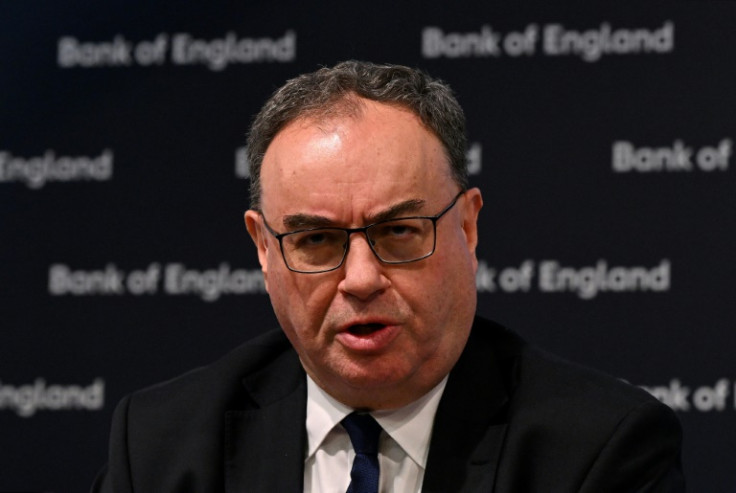Bank Of England Freezes Rate As Inflation Stays High
The Bank of England froze its key interest rate Thursday for a fourth meeting in a row, matching US Federal Reserve policy, as high inflation prevents cuts to borrowing costs.

The Bank of England froze its key interest rate Thursday for a fourth meeting in a row, matching US Federal Reserve policy, as high inflation prevents cuts to borrowing costs.
At a regular policy meeting, the BoE left its rate at 5.25 percent, the highest level for 16 years.
BoE governor Andrew Bailey said there was a "need to see more evidence that inflation is set to fall" to the bank's "2.0-percent target, and stay there, before we can lower interest rates".
UK annual inflation stands at 4.0 percent after inching up from 3.9 percent, according to the latest official data.
But it has fallen sharply from a 41-year peak of 11.1 percent in October 2022.
The BoE hiked its key interest rate 14 times between late 2021 and second half of last year.
Global inflationary pressures started to build after Covid lockdowns were lifted. They went on to skyrocket when energy prices soared following the invasion of Ukraine by major oil and gas producer Russia.
The BoE forecast that UK annual inflation could fall to 2.0 percent in the spring before climbing again.
"Material risks remain from developments in the Middle East and from disruption to shipping through the Red Sea," minutes of the meeting said.
"We expect inflation to fall, though with some bumps along the way," the BoE added.
Container shipping through the Red Sea has dropped by nearly one-third this year as attacks by Yemen's Huthi rebels continue, the International Monetary Fund said Wednesday.
This has pushed up transport costs.
"There are always risks that can change the outlook," Bailey told a press conference.
"Sadly geopolitical risks have intensified following events in the Middle East. There has so far been a limited impact on wholesale energy prices but shipping volumes have fallen materially on Red Sea routes and... shipping costs have increased."
Bailey joined five other policymakers in voting to keep the rate unchanged, while one called for a cut and two for a rise in borrowing costs.
Analysts said they still expected UK rate cuts this year and possibly as soon as June.
"Much of the broader economic picture adds weight to the argument for cuts," Susannah Streeter, head of money and markets at Hargreaves Lansdown, said following the BoE update.
"Growth has been stagnant, and it's likely the (UK) economy tipped into a very mild recession at the end of 2023, with companies and consumers showing a lot more caution in their spending."
Britain's economy shrank 0.1 percent in the third quarter of last year. A fourth-quarter contraction would place it in a technical recession.
Across the Atlantic, the Federal Reserve on Wednesday indicated that while it was moving towards US rate cuts, they probably would not occur before May at the earliest.
It came after the Fed said it was holding its benchmark lending rate at between 5.25 and 5.50 percent, a 23-year high.
© Copyright AFP 2025. All rights reserved.





















